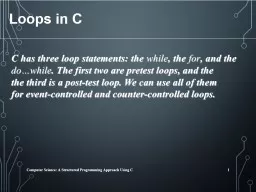PDF-InquiryInstructionin the AP Science ClassroomAn Approach to Teaching a
Author : willow | Published Date : 2021-09-25
include reading about known scientific theories and ideasgenerating scientificallyoriented questionsmaking predictions or posing preliminary hypotheses planning
Presentation Embed Code
Download Presentation
Download Presentation The PPT/PDF document "InquiryInstructionin the AP Science Clas..." is the property of its rightful owner. Permission is granted to download and print the materials on this website for personal, non-commercial use only, and to display it on your personal computer provided you do not modify the materials and that you retain all copyright notices contained in the materials. By downloading content from our website, you accept the terms of this agreement.
InquiryInstructionin the AP Science ClassroomAn Approach to Teaching a: Transcript
Download Rules Of Document
"InquiryInstructionin the AP Science ClassroomAn Approach to Teaching a"The content belongs to its owner. You may download and print it for personal use, without modification, and keep all copyright notices. By downloading, you agree to these terms.
Related Documents














